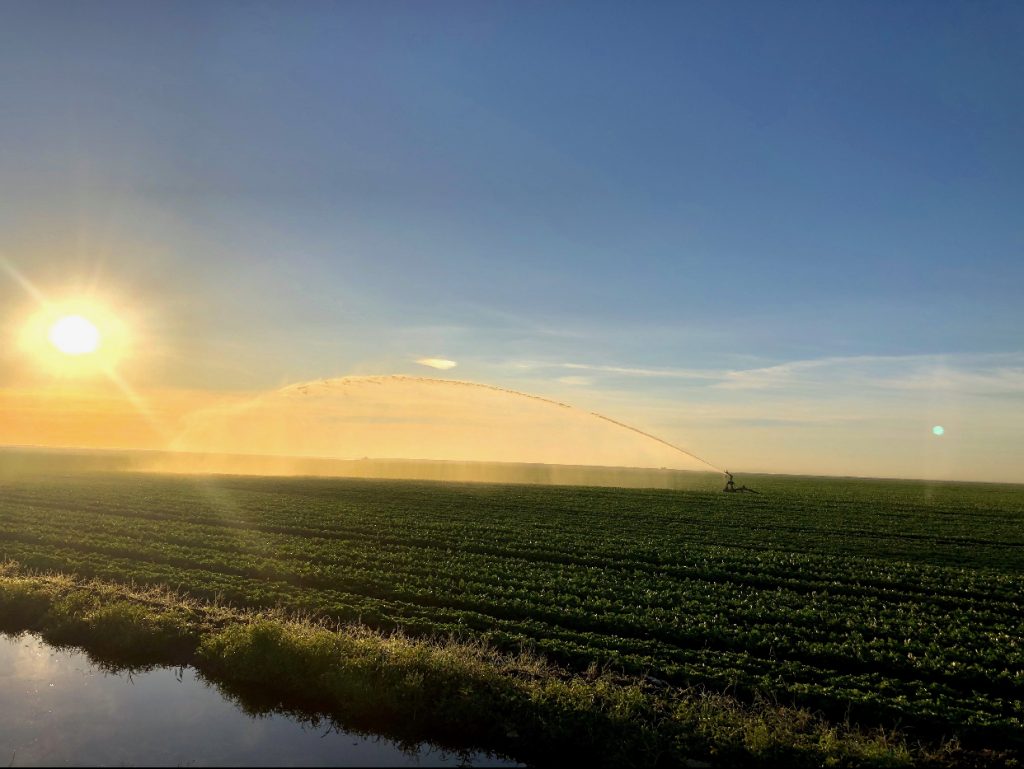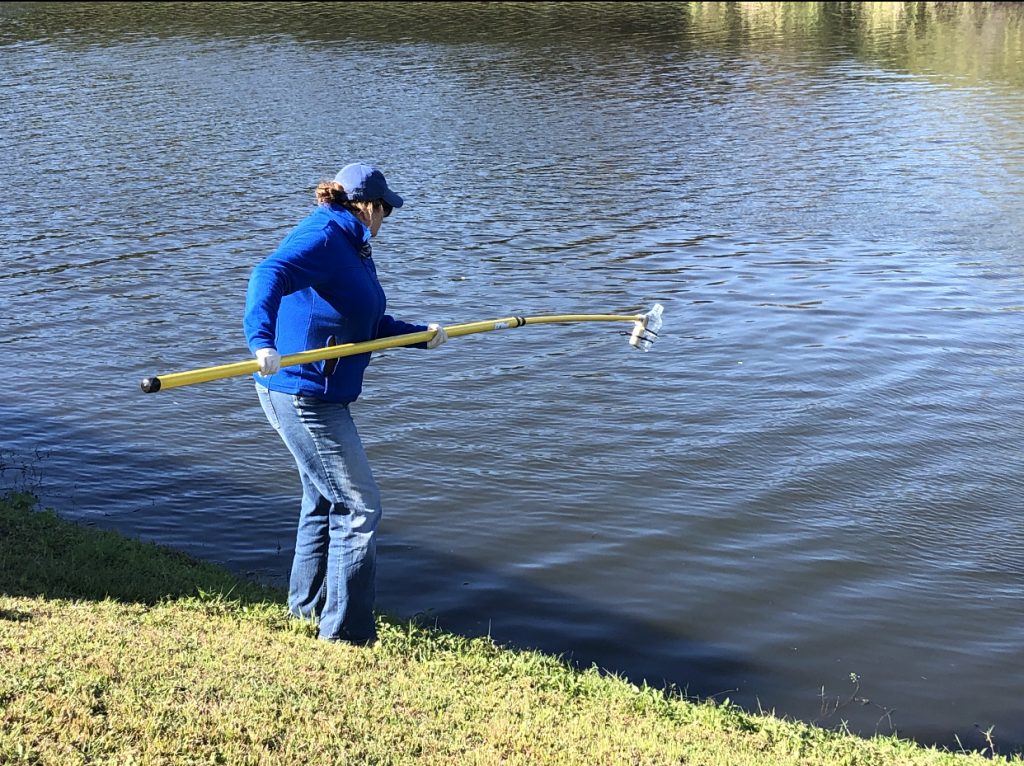
By Taylor Langford, Matt Krug and Michelle Danyluk
The Food Safety Modernization Act’s Produce Safety Rule (PSR) highlights the need to reduce risks associated with agricultural water (e.g., irrigation, fertigation, foliar sprays, frost protection, etc.) that will contact fresh produce. The PSR requires some growers to monitor the quality of their agricultural water by analyzing generic E. coli populations through sampling frequently enough to establish a microbial water-quality profile. This testing is applicable to growers who use agricultural water from surface or ground water sources that contacts the harvestable portion of produce covered by the PSR.
As of January 2020, the compliance dates for all operations covered under the PSR have passed, excluding the requirements on agricultural water. In March of 2019, the Food and Drug Administration (FDA) announced new compliance dates for agricultural water. Compliance is currently scheduled to begin in January of 2022, 2023 and 2024 for large, small and very small farms, respectively.
The delay in compliance for water was based on feedback from the industry that the written standards are too complex to implement. In response, FDA is currently exploring alternatives to simplify microbial quality and testing standards while still protecting public health.
OUTBREAK OUTCOMES
However, not long after FDA’s announcement to delay compliance dates and review requirements, a multistate outbreak of E. coli O157:H7 involving romaine lettuce was announced by the FDA and Centers for Disease Control and Prevention. This outbreak came on the heels of two other outbreaks related to romaine in April and November of 2018.
An executive summary published by the FDA on May 21, 2020, announced the findings of the outbreak investigation. The findings pointed toward contamination of surface water used for irrigation combined with close proximity to cattle feeding operations and unusual weather events (frost and wind) as the most likely culprits.
The investigation also revealed that the surface water implicated in the outbreak was tested by growers and met the water quality criteria in the PSR. This has added another layer of complexity to the process of identifying suitable strategies and realistic expectations for ensuring the safety of water used during crop production.
The revelations that the agricultural water provisions of the PSR were being delayed and that there was a produce outbreak related to pre-harvest water that met the current PSR requirements resulted in various efforts to identify appropriate risk reduction strategies. In response, FDA developed the Leafy Greens STEC (Shiga toxin-producing E. coli) Action Plan that included public and private stakeholders. The plan is designed to expedite actions to prevent future outbreaks associated with leafy greens.
One of the goals of the 2020 Leafy Greens STEC Action Plan is to “advance agricultural water safety.” Recognizing the diversity among agricultural production systems, the plan is focused on identifying standards that are workable across a variety of farms, water sources and uses. One of the actions identified by the plan is to advance a proposed rule for agricultural water for covered produce other than sprouts.
Following the outbreaks involving romaine in 2018, the United Fresh Produce Association and the Produce Marketing Association developed a diverse Romaine Task Force that consisted of over 100 industry, academic and regulatory stakeholders. Some recommendations were developed specific to romaine, and others were broader recommendations. The task force recommended adoption of the new California/Arizona Leafy Greens Marketing Agreement (LGMA) water treatment metrics, which require surface water applied via overhead to leafy greens plants within 21 days of harvest to be treated.

California has recently approved the new LGMA water metrics, which included over 50 changes to strengthen food safety requirements in areas of farm water use and field/equipment sanitation. The new requirements for water are focused on ensuring the safety of water used in overhead crop sprays, enhancing water-monitoring requirements, and minimizing the risk of water applied with furrow irrigation from coming into contact with the edible portion of the crop. These newly adopted changes are in addition to the metric that was added last year.
As previously seen, food safety standards adopted by, or developed for, certain commodities or segments of the produce industry often shape broader market-driven and regulatory standards that apply across the board. It is still unknown how newly adopted standards and decisions made by agreements and task forces will shape FDA’s thinking on revisions to the PSR.
GROWER GUIDANCE
The Florida produce industry should remain engaged in the process to identify and adopt strategies that satisfy general concerns around use of agricultural water. Although the compliance dates of the PSR water-testing provisions have been delayed, growers who have not previously tested their agricultural water should consider implementing testing now to better understand the microbial quality of their water sources.
Produce Safety Rule inspections, conducted by the Florida Department of Agriculture and Consumer Services (FDACS), after a pause at the beginning of the COVID-19 pandemic, have resumed and are continuing throughout the state. Scheduling of inspections generally follow the patterns of produce production across the state. The initial round of inspections is intended to be educational in nature, but inspectors are obligated to take measures to protect public health if serious issues are observed.
To prepare for inspections, growers, harvesters and packers should, at a minimum, follow Good Agricultural Practices and attend a Produce Safety Alliance (PSA) grower training. The PSA grower trainings continue to be offered at the highly subsidized price of $25 through collaborations with the University of Florida Institute of Food and Agricultural Sciences (UF/IFAS) and FDACS. Due to the COVID-19 pandemic, PSA trainings are being offered remotely and capacity is limited. See crec.ifas.ufl.edu/extension/events/ for the list of upcoming PSA grower training events.
The On-Farm Readiness Review (OFRR) program is another way to help growers prepare for a PSR inspection. The OFRR is a personalized site visit in which UF/IFAS and FDACS representatives can address questions about practices or conditions at a specific farm or packinghouse, including discussions related to agricultural water use. There is no cost associated with an OFRR. Sign up at fdacs.gov/FSMA for an OFRR.









